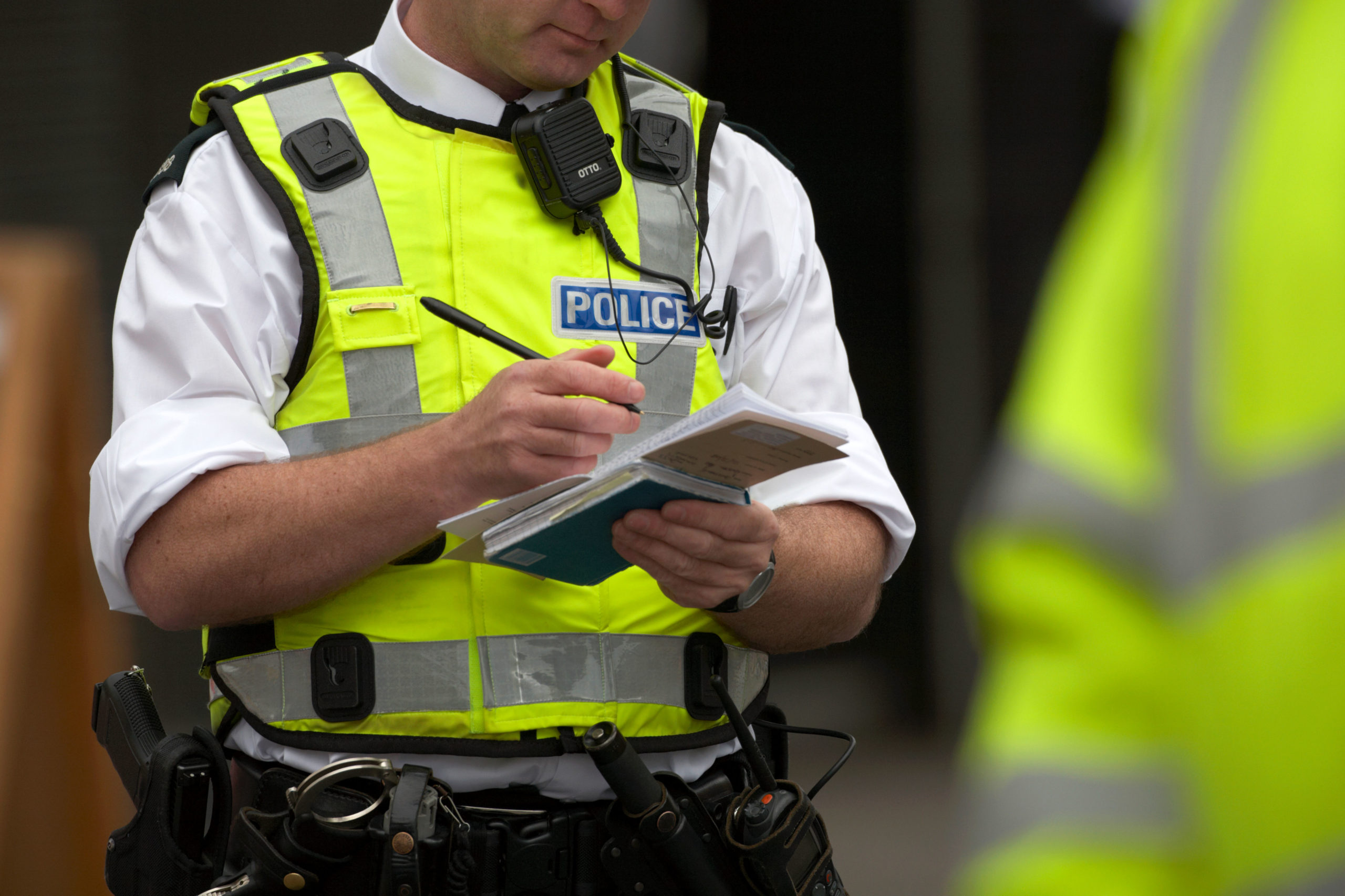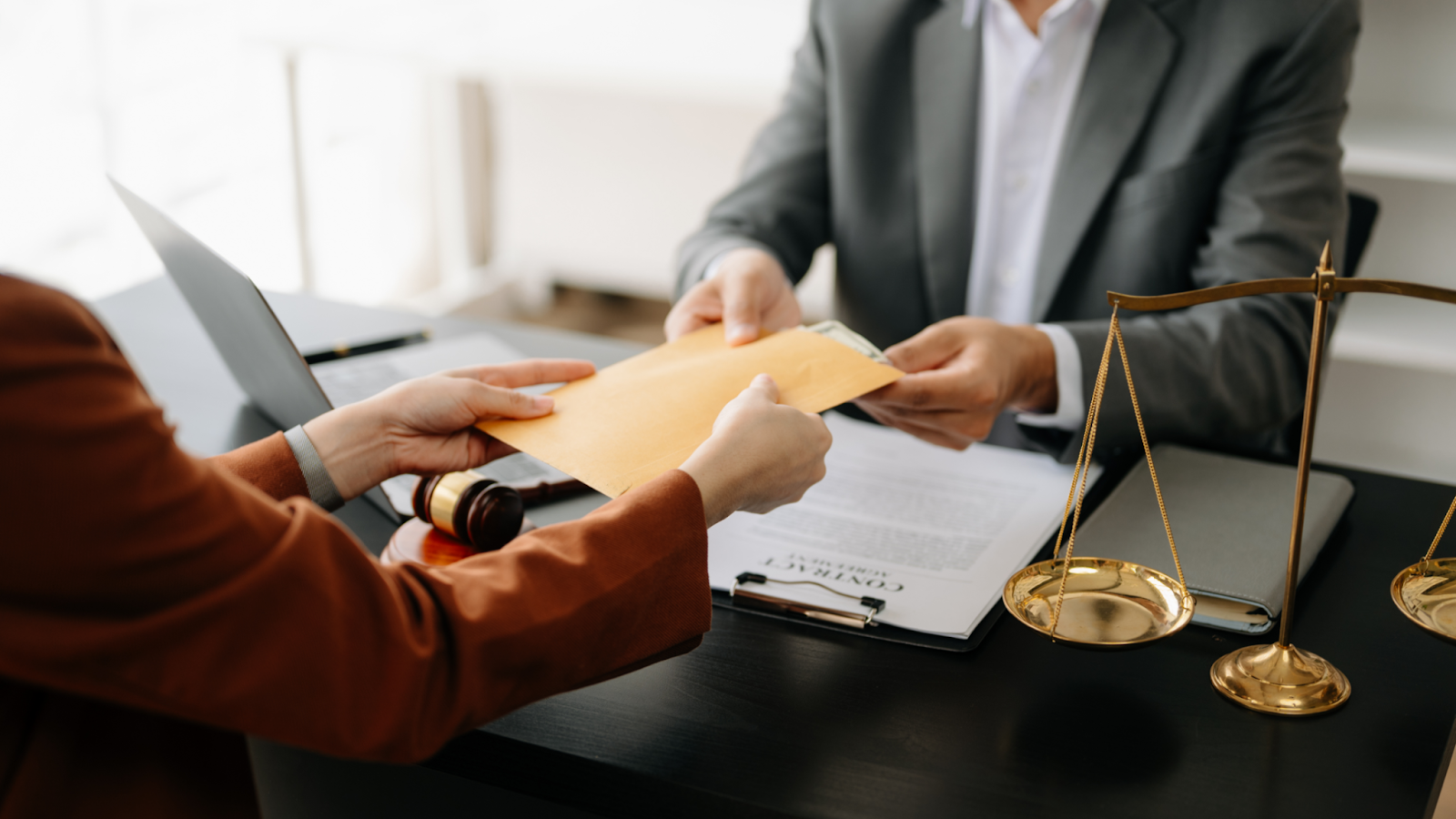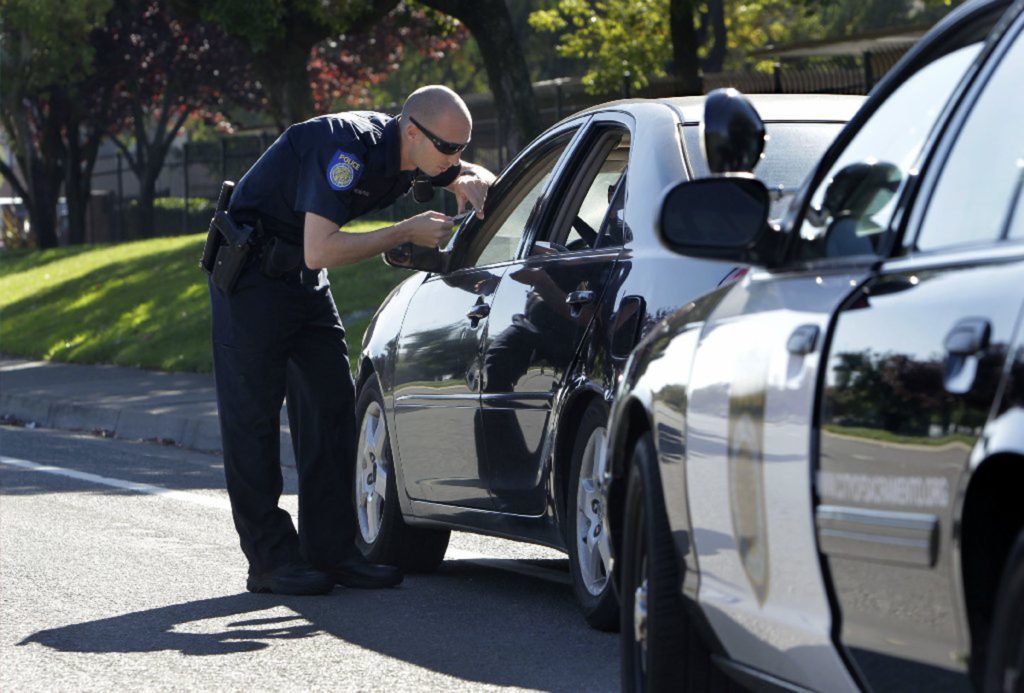In the UK, a police officer arresting someone typically states, “I am arresting you on suspicion of something. You have the right to remain silent. Anything you say can and will be used against you in court. You have the right to an attorney.
If you cannot afford one, one will be provided for you.” This statement informs the individual of the reason for arrest and their legal rights. It’s crucial to comprehend these rights to navigate interactions with law enforcement effectively and ensure fair treatment throughout the legal process.
What can I be arrested for?
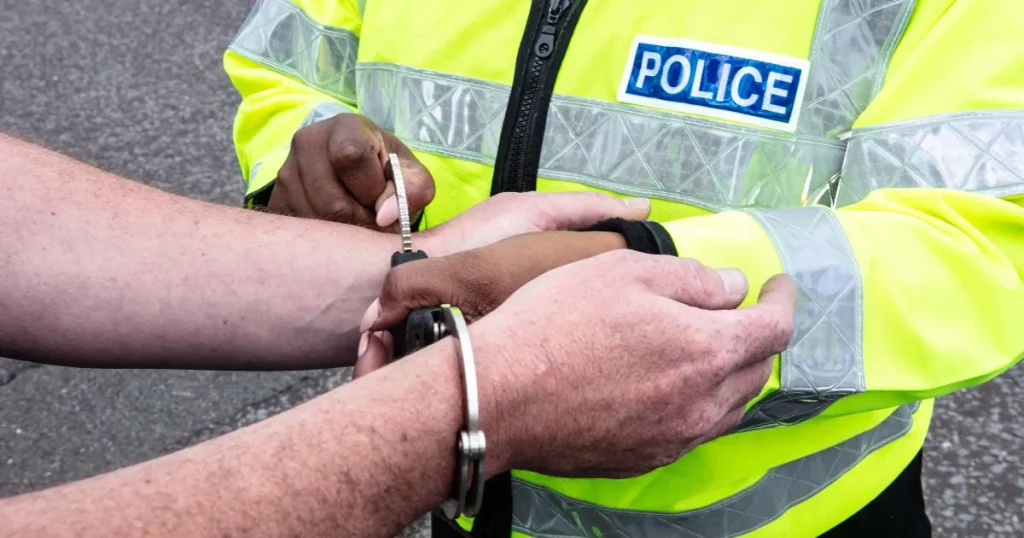
You can be caught for many reasons, including breaking the law or doing illegal things. Common reasons for arrest include:
Criminal Offenses
Criminal offenses encompass various illegal acts, including assault, drug usage/sale, theft, fraud, vandalism, and burglary. Committing these offenses leads to legal consequences, such as fines or imprisonment.
Violence
Violence refers to using physical force with intent to harm, intimidate, or control others. It includes actions like assault, domestic abuse, and public disturbances. Perpetrators of violence can face legal penalties and social consequences.
Driving Offenses
Driving offenses encompass violations of traffic laws while operating a vehicle. These include driving under the influence of alcohol or drugs, reckless driving, and driving without a valid license. Such offenses endanger public safety, leading to legal consequences like fines, license suspension, or even imprisonment.
Warrants
Warrants indicate legal authorization for a person’s arrest, search of property, or seizure of assets. They’re issued by a court when law enforcement demonstrates probable cause. Failing to address warrants can lead to arrest and legal actions.
Breach of Peace
Breach of peace encompasses actions that disrupt public order and tranquility, such as public disturbances, riots, or inciting violence. Law enforcement intervenes to maintain safety and may make arrests to restore order and prevent harm to individuals and property.
Sexual Offenses
Sexual offenses involve non-consensual sexual activities, harassment, or possessing explicit material involving minors. Convictions lead to legal penalties, including imprisonment, to safeguard individuals from harm and uphold societal standards.
White-Collar Crimes
White-collar crimes encompass non-violent financial offenses like embezzlement, insider trading, and money laundering. Perpetrators exploit positions of trust for personal gain, leading to legal consequences such as fines and imprisonment.
Trespassing
Trespassing involves unlawfully entering or remaining on someone else’s property without permission. It constitutes a violation of property rights and can result in legal actions, including warnings, fines, or arrests.
Public Order Offenses
Public order offenses encompass actions that disrupt societal harmony, like rioting, inciting violence, or hate crimes. Law enforcement intervenes to maintain peace, and arrests are made to prevent chaos and safeguard public safety.
Cybercrimes
Cybercrimes involve illegal online activities, such as hacking, identity theft, and fraud. Perpetrators exploit digital vulnerabilities, causing financial losses and breaches of privacy. Convictions lead to legal penalties, including fines and imprisonment.
Probation
Probation involves individuals convicted of crimes serving sentences outside jail under supervision. Failure to adhere to terms can lead to arrest and imprisonment, while compliance may result in sentence reduction or dismissal.
If you are arrested what should you say to police?
If arrested, remember these points when talking to the police:
- Stay calm, and avoid arguments.
- Share basic info, but exercise your right to silence.
- Say, “I want a lawyer,” or “I’m invoking my right to remain silent.”
- Politely decline searches with “I do not consent to a search.”
- Be respectful, and avoid false statements.
- Note officers’ details.
- Follow lawful instructions, but you can remain silent.
- Seek legal help before talking extensively to the police.
- Remember, protecting your rights is crucial during any interaction with law enforcement.
What happens if you are arrested
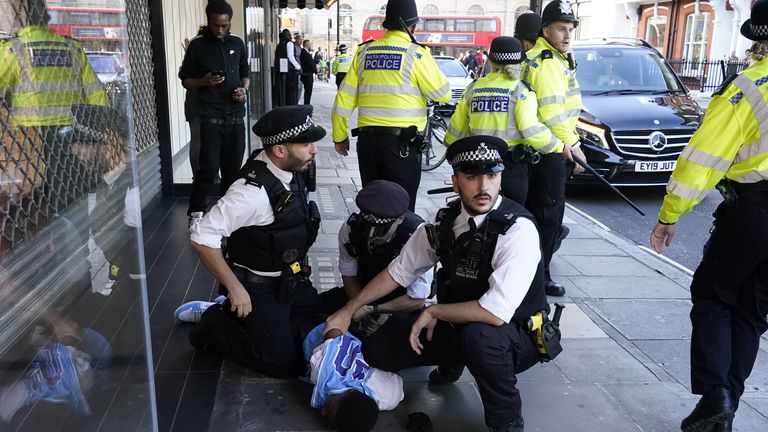
When you’re arrested, several legal steps are taken to ensure your rights are protected, and the law is followed. Here’s what generally happens:
- Law enforcement detains you based on suspicion of breaking the law. This initial step involves ensuring public safety and further investigation.
- Upon arrest, the police inform you of your rights, known as Miranda rights. These include the right to remain silent and the right to an attorney. Anything you say can be used as evidence against you.
- To establish your identity, the police gather your details. This aids in accurate documentation and legal processes.
- Your photograph and fingerprints are taken. These identification measures help law enforcement keep accurate records and prevent identity confusion.
- Law enforcement may search your belongings for evidence, weapons, or items relevant to the alleged crime. This step helps ensure the safety of officers and prevents potential evidence tampering.
- Depending on the circumstances, you might be held temporarily in a designated area until certain legal procedures are carried out, such as a court appearance or bail determination.
- You’re presented before a judge, who informs you of the charges against you. At this stage, the judge might also decide on bail – an amount you can pay to be released from custody while awaiting trial.
- If granted bail, you have the option to pay a predetermined sum. This allows you to be released from custody until your scheduled court date. Failing to pay keeps you in custody.
- You have the right to an attorney. If you can’t afford one, a public defender may be appointed to represent you. This ensures your legal rights are protected throughout the process.
- Your case progresses with legal proceedings, which can involve hearings, motions, and, if necessary, a trial. These steps allow both sides to present evidence and arguments.
- During your court appearances, you’ll be asked to enter a plea – guilty, not guilty, or no contest. Your plea sets the direction for further legal proceedings.
- You have the option to be represented by a lawyer. If you cannot afford one, the court may provide legal counsel to ensure a fair trial.
- Depending on the nature of the charges, more court actions, such as hearings or a trial, may follow to determine the outcome of your case.
What should I do if I’ve been wrongfully arrested?
Here are some things to think about if you suspect you were unlawfully arrested:
- Stay calm and cooperative with the authorities. Resisting arrest or arguing at the scene can escalate the situation.
- Remember your “Miranda rights” – you have the right to remain silent and the right to an attorney. Use these rights to your advantage.
- Cooperate by providing identification and basic information. You don’t have to discuss the case without an attorney present.
- Mentally note officers’ names, badge numbers, locations, and any witnesses. This can be useful later.
- Avoid discussing your case with anyone, including other inmates. Anything you say can be used against you.
- Seek legal representation as soon as possible. A lawyer can guide you on how to proceed and protect your rights.
- Collect any evidence that might support your innocence. This could include witnesses, documents, or surveillance footage.
- While you should cooperate, don’t provide more information than necessary without legal counsel.
- You can file complaints with the appropriate authorities if you believe your rights were violated.
- If necessary, your lawyer will help you navigate legal proceedings, including presenting evidence in court.
- The legal process can take time. Stay patient and let your lawyer guide you.
- Reach out to friends, family, or support groups to help you through the process.
Moreover, it’s vital to have legal representation to ensure your rights are protected and your case is properly evaluated. Respectfully following your attorney’s advice will help you handle the situation more effectively.
FAQs
Can you refuse to talk to police UK?
Yes, you can remain silent in the UK when dealing with the police. You’re not required to answer their questions and can respond with “no comment.” If approached as a witness, you can decline to provide information. It’s recommended to consult a solicitor before speaking to safeguard your rights.
Can a police officer make an arrest for a small crime in the UK?
Yes, in the UK, police officers can make arrests for small crimes. Which is known as “summary offenses.” They can arrest if they believe the person committed an offense. It’s necessary to prevent further harm or ensure their court attendance.
Can a police officer arrest someone without a legal cause in the UK?
No, in the UK, a police officer cannot arrest someone without reasonable grounds or a legal cause. There must be a valid reason to make an arrest, such as suspicion of committing a crime. Unlawful arrests can be challenged through legal processes.
Can the police charge you without arresting you in the UK?
Yes, in the UK, the police can charge you without arresting you in certain cases. This typically happens for less serious offenses. Instead of arresting, they provide a “Postal Requisition” or “Summons” stating the charges and court date. However, for more serious cases, arrest may precede the charges.
How long can the police hold you at the police station for?
In the UK, the police can generally hold you in custody for up to 48 hours from the time of arrest. After this period, a judge’s approval is needed to extend the custody. This ensures that there is probable cause for the charges or that the need for further detention is justified.
Final Verdict
During UK arrests, officers commonly say, “I’m arresting you for something. You can remain silent…” Acknowledge the importance of knowing your rights. However, I highly recommend reading the enlightening article for comprehensive insights into arrest procedures and valuable advice on protecting your rights.
Empower yourself with the knowledge to confidently navigate such situations and ensure fair treatment. Additionally, your awareness can significantly impact your interactions with law enforcement.







